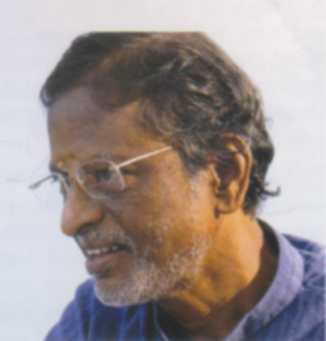
by E.R. Gopalakrishnan A former actor/director of Koothu-P-Pattarai.
(Continued from last fortnight)
It was decided to stage Suvarottigal – Na. Muthuswamy’s new play. Initially we were just the four of us, and we needed more players. We roped in the brothers Kasi and Sambandhan along with their cousin Mani. We later brought in Bernard Chandra, Panneerselvam, Kumar and Radhakrishnan. There were two other members – one distantly related to Kasi, the other was Vasudevan.
Our meeting place was the Lalit Kala Akademi Regional Centre on Greame’s Road, which had just about then come into existence. In fact, construction work was going on for one more block. Rajaraman was the Regional Secretary. He was very accommodating. If there was rain or a strong breeze, he would permit us to work inside the building. We often worked on the terrace if there was a painting exhibition or workshop below.
Our team met around 6 p.m. every day. Bernard and I were working at faraway Thuraipppakkam, but somehow managed to reach Lalit Kala Akademi in time as we were both working as Assistant Professors and our classwork was over by 3 p.m. Muthuswamy was working for TAFE India on Sterling Road. Kasi and his friends were usually the last to join us. Invariably all of them were tired and hungry due to the nature of their work but we could not afford more than a ‘single tea’ and a half bun or porai (a hardened, bland, bakery product peculiar to Madras). We would work till 9 p.m. and disperse.
For the first three months our group simply worked with the body, not on dialogue. There was a blend of a few Kalari movements, flexibility exercises, workouts for strength and stamina improvement, developing balance, tumbles, and inversions. We were totally drained out. Most of us, not used to such workouts, ended up with severe cramps and even absconded after a few days. It took some time for us to ‘acclimatise’ ourselves. We were also introduced to theatre games, trust building, and voice throw.
The play was jointly directed by KC and Krishnamoorthy. KC took care of the actors’ training, movements, blocking and dialogue modulation and Krishnamoorthy worked on stage design, props, costume and overall presentation.
Suvarottigal, meaning ‘posters’ or ‘persons pasting the posters’, is the play in which Muthuswamy started using Terukoothu elements which resonated in all his subsequent plays. Like his Naarkalikkarar, this play too was a commentary on society, with particular reference to the poster culture of Tamil Nadu.
The essential message of the play was that social behaviour was conditioned by posters in all aspects of life, and it showed how the politics of posters snowballed into the politics of poster boys. Muthuswamy was really prophetic. The poster culture, special and peculiar to Tamil Nadu, has in recent times taken different forms, like graffiti, digital banners, and flexiboards. Street battles and murders take place on account of the poster wars. Society as a whole seems to be governed by the posters, for the posters and of the posters.
* * *
Lalit Kala Akademi was our natural choice to stage the production because, one, we were quite at home there and, two, we had very limited funds to stage the play at any other venue. The money we had came from contributions from all of those who were part of the play. This being the first official production of Koothu-P-Pattarai, we decided to have posters. Natesh (Muthuswamy’s son), who had attended a workshop on screen printing, helped us print a black and white 3’x2’ poster in Muthuswamy’s house. The hand printing and drying were challenging. Heavy winds from the beach and untimely drizzles added to the anxiety of all of us the whole night.
Two days before the event, around 9 p.m., we started out on two bicycles to paste the posters. By the time we finished, it was 5 a.m. Not only did people look at us strangely, but even the night patrol police stopped us near Panagal Park to find out what we were up to.
After nearly six months of hard work, D-Day finally arrived on the lawns of Lalit Kala Akademi. There was no arrangement for ‘lighting’ in the theatrical sense. We just had two high wattage bulbs tied to two bamboo sticks to increase the visibility of the theatre actions. The acting space was in the centre of the lawn and spectators sat all around and in the pathways. There were some stone sculptures in the spectators’ area. The open space, stone sculptures, trees and the construction material lying around together created an out-of-the world ambience.
The play, in its written format, was branded as abstract. The abstraction was further intensified by the use of wooden frames as props for mirrors and hand-made masks for the characters for situational usage. The actors’ faces were coloured like those of Terukoothu artistes. Everything presented in the play was new in the context of the Tamil environment. The movements of the actors were stylised in selected areas, while the rest of the play had realistic movements with a natural flow in those sequences. I personally felt that the use of the body and of its dynamics in the production was not in proportion to the kind of training we had.
At the end of the play we invited the audience for a discussion. The educated and informed spectators told us they could not understand the play but concurred that it was definitely a different experience. Surprisingly, the feedback of the children and women from nearby slums and the police quarters was more appreciative. They were comfortable in following the spirit and message of the play without any difficulty! – (Courtesy: Sruti)
(Concluded)
|

